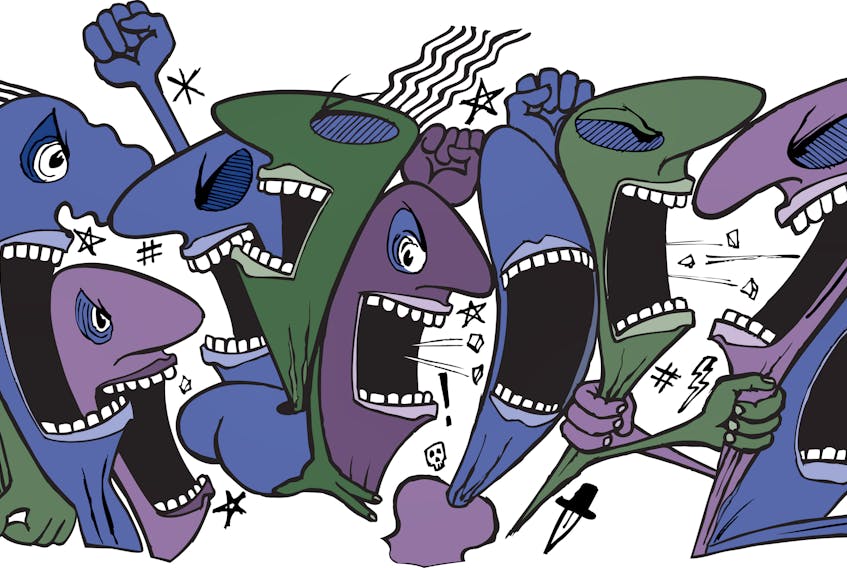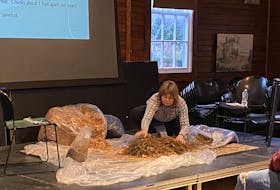Monday morning news isn’t for the faint of heart.
I try to keep an ear open on weekends to keep up to date, but sometimes things escape notice.

This week though, it was hard to skip one story in the news feed. A man died by suicide last December after enduring months of online abuse.
The story acknowledges Jeremy Quaile had mental health issues and that no one sole factor is at fault, but his family says he was pilloried after the Calgary Humane Society named him in a story about his dog’s death during a heatwave.
I will spare you the details because, in the end, it is not the manner of his dog’s death that is important to the discussion, but what later happened to Quaile.
The man received hundreds of messages, condemning him to all manner of horrible deaths. He was described in terrible terms, and though he made efforts to respond to what he saw as untruths, it was to no avail.
In January, Kristin Raworth came forward alleging sexual harassment from former federal cabinet minister Kent Hehr. After initial support for her action in coming forward on a Wednesday, the abuse, manifesting itself as rape and death threats, began on social media, moved to her phone line, and then arrived at her home.
By Saturday, she was told not be alone and was being watched by government security.
The abuse did not stop with her but also included threats to her family. In an interview with Post Media, Raworth said: “I can’t go home tonight, because I’m worried about what will happen to me. I wish I hadn’t said anything. If this is the price, it’s just not worth it to me. Not now.”
Last month, popular financial advice columnist Gail Vaz-Oxlade, who retired in 2016, decided she could not stand by and be silent when the Ontario Tories elected Doug Ford as their leader. She revived her blog and this week shared with readers some of the abuse she has received since deciding to be more public about her advocacy.
What matters is how people have responded. And, dear readers, the response shows a dismaying trend in public discourse across social platforms.
Vaz-Oxlade recounted how she had been dissed on her appearance and how she had been called rude names of every sort, including ones that cannot be broadcast. A quick scan of her Twitter feed showed some blanks where tweets had been deleted or account owners had been removed altogether. Presumably these tweets violated the terms of service or perhaps the authors had second thoughts.
Still, it pales in comparison to what Nora Loreto, a freelance journalist has received in the last week. Like Quaile, Loreto has received thousands of messages, tweets and Facebook posts following a tweet she made questioning the dissonance of empathy between certain types of victims, in the wake of the Humboldt Broncos crash in particular.
Again, like Quaile, it matters not what she said or did. What matters is how people have responded. And, dear readers, the response shows a dismaying trend in public discourse across social platforms.
It’s hateful. It’s horrifying. And it’s not new.
In 2015, British journalist Jon Ronson looked at online shaming and abuse in his book “So You’ve Been Publicly Shamed.” Ronson looked at the feelings of righteousness underpinning most public shaming incidents and reported on how many people lost their jobs as a result of being shamed. If you look at posts and tweets about Quaile and Loreto, you’ll see many calls for them to lose their livelihoods.
One person asked if the Quaile named by the Calgary Humane Society was the same one who worked for a certain company. Loreto’s Twitter feed is full of demands that her freelance clients never hire her again.
There’s a difference between holding someone accountable and putting them in the stocks for a public flogging or worse, as has become apparent with Raworth’s and Loreto’s receipt of rape and death threats. Summary justice dispensed by mobs, including those whose cause is righteous, leads to injustice of epic proportions.
It will be interesting to see how calls for justice evolve depending on the ideological stripes of those affected.
Martha Muzychka is a writer and consultant working in St. John’s.









